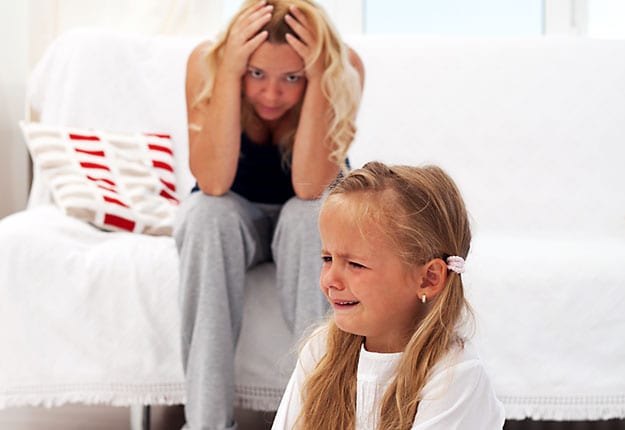Sometimes as parents we are more reactive than proactive when responding to our children. It is important to understand how to react to children’s unpredictable behaviour in a proactive and constructive way to avoid threats, nagging, shouting, verbal aggression and humiliation as forms of retaliation.
When our children are displaying inconsiderate or challenging behaviours we as parents can either react or respond proactively. The difference is that when we react, we act without thinking (shouting or making threats that are unrealistic) and when we respond proactively, we think before we act. Negative behaviour exhibited by parents only reinforces this behaviour in children so it important have a bag of tricks to ensure your responses are fair and reasonable.
Dr Anna Cohen, Sydney’s leading Clinical Child Psychologist provides parents with frameworks and strategies to stay calm and rational when dealing with their children’s undesirable behaviour to avoid escalating situations.
1. Discourage inconsiderate behaviour.
It is important for parents to look at why their child is displaying negative behaviour. It is normal for children to start by acting inconsiderately as they may not know any better, but it is up to parents to guide the child’s behaviour to develop self-regulation. Make sure they are aware of what they have done wrong by responding immediately and explaining what to do instead of what not to do. Giving recognition for positive behaviour to children is essential, as they will begin to understand an expectation of how you want them to behave.
2. Demonstrate model communication and behaviour.
Children learn how to interact with their peers from how their parents speak to them and each other. Children need to be taught not controlled, so demonstrating respectful behaviour will demonstrate that this is the correct way to act. Learning to use constructive communication using clear and direct speech is important in getting children to do what is asked of them. Placing your own feelings into a situation by using “I” statements is one strategy that will teach your child empathy by understanding how their behaviour affects others. This will also avoid any escalating conflict as it means you are not placing blame and ensure your child doesn’t need to feel defensive or aggressive.
3. Avoid raising your voice.
Parents need to be firm and caring toward their kids. Raising your voice or yelling is a negative reaction that will not be beneficial in getting your child to do something you want. Arguing with your child creates a negative role in which you will lose their respect, which over time causes children to stop responding. When parents respond in a non-threatening way by remaining calm, rational and respectful, children tend to respond in a productive way.
4• Set family expectations.
Expectations are essential for children to understand their limits. Having a family discussion on household expectations can provide the opportunity to discuss issues before they become apparent and gives everyone an opportunity to have input. Creating expectations doesn’t just come from having a set of rules. Consider how you respond to your child’s good and bad behaviour, whether this is in a constructive way that instills how you want them to behave. Giving merit for good behaviour shows that their behaviour is seen and appreciated and will translate to them learning self-awareness to how they should behave.
5• Other techniques to avoid.
When handling your child’s undesirable behaviour it is easy to fall into the trap of being critical. It is important to steer clear of shaming behaviour that will lead to more conflict. Threatening and nagging can lead to things being said by parents that won’t be followed through on. Humiliation is another reaction that parents should avoid, where they criticise the child’s character rather than behaviour. This will cause the child to act as they are being described. Parents need to describe the inappropriate behaviour and state that is not okay and describe the appropriate behaviour that they want to see.
It is important that parents assert compassion and understand how to react in the most constructive way to their children. Whilst it is easy to fall into reacting critically, developing strategies to stay positive and avoid engaging in conflict with your children is essential. If parents are calm, consistent, assertive and able to react in a proactive way to control a situation, their children will always feeling safe and secure- and most importantly loved.
For more information or professional advice contact Sydney’s leading Child Clinical Psychologist, Dr Anna Cohen at Kids & Co. – www.kidsandco.com.au
Share your comments below.
Shutterstock photo




















-

-
-
mom94125 said
- 06 Sep 2017
-

-
-
mom101628 said
- 17 Jul 2017
-

-
-
june11 said
- 11 Jul 2017
-

-
-
mom90758 said
- 07 Jul 2017
-

-
-
hopefullyheidi said
- 06 Jul 2017
-

-
-
mom221790 said
- 06 Jul 2017
-

-
-
mom206279 said
- 06 Jul 2017
-

-
-
BellaB said
- 06 Jul 2017
-

-
-
mom160421 said
- 06 Jul 2017
Post a comment1:40 pm
8:20 pm
5:56 pm
12:36 pm
9:30 pm
9:20 pm
7:29 pm
3:08 pm
1:04 pm
To post a review/comment please join us or login so we can allocate your points.